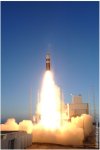
The French White Paper on defence and national security
Industrial and technological priorities for 2025
Nuclear systems
The capability to design, develop and produce nuclear weapons, as well as ensuring their safety and reliability, will be retained as a fully sovereign prerogative. Such a priority implies that laboratories, scientific research and production facilities will be allotted the human, technical and industrial resources required for our strategy of nuclear deterrence.
Space systems
France is the only European country to have developed ballistic missiles. As both the M51 missile and the Ariane-V rocket have completed the development stage, preserving our core competencies in such a strategic field is essential to our concept of deterrence and Europe’s access to space. France will maintain, on a national basis, the specific competencies it developed in the field of ballistic missiles – specifically, high performance inertial guidance and solid-state propulsion industrial and technological know-how.
For all other activities pertaining to space, satellites in particular, European efforts are too scattered to be effective. France will actively support the rationalisation of European space industry, with a focus on intelligence-gathering, navigational and communications satellites.
Naval systems
Submarine capabilities are of strategic importance, as much for deterrence and intelligence as for intervention. In the latter context, they allow for long-range precision strike and facilitate special operations.
France will retain a national design and production capability for nuclear-powered submarines. All other components of sea power, such as conventional submarines or surface ships, are open to European cooperation.
Aeronautics systems
The credibility of the airborne nuclear component depends on a national capability to develop a fighter aircraft programme and carry out the necessary adaptation of its systems for its nuclear mission.
However, as fighter aircraft programmes are reduced in scope and extended in time, all European actors in this field will be faced, sooner or later, with the prospect of dwindling competencies, and how best to protect them.
France will support the inception of a European military aircraft manufacturer capable of designing future combat systems, manned or unmanned.
France will contribute actively to the implementation of a strategy, both national and European, for the design, production and acquisition of unmanned aerial vehicles (UAVs), for surveillance or combat.
Land systems
France will support the emergence of an integrated European industrial capability for land equipment, including production of ammunition.
Missile systems
Missiles in general and cruise missiles in particular, are critical components of our intervention capability.
France will ensure the continued existence of European capabilities in this sector, based on Franco-British cooperation, with the proviso that core national competencies will be maintained, in particular all those pertaining to the airborne nuclear component.
Security of information
Increasing threats on our information systems and networks warrant the preservation of robust national capabilities. The national industry should remain capable of developing its own security products, to include encryption. Presently, these capabilities are insufficient in scope and excessively fragmented.
France will launch and support an industrial strategy leading to a significant increase in national capabilities of design and production in the field of information system security.
Electronic components in the defence sector
The national and European technological and industrial base for defence electronic components is fragmented. In order to establish a more balanced relationship with countries which impose their own national regulations in this field, the United States and the ITAR regulations. France will support a European approach conducive to the emergence of a European industrial base. The objective is to preclude situations of critical dependency which increasingly restrain our ability to export freely.
|
NEWSLETTER
|
| Join the GlobalSecurity.org mailing list |
|
|
|




